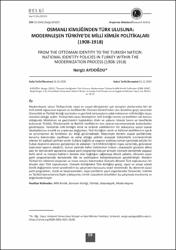OSMANLI KİMLİĞİNDEN TÜRK ULUSUNA: MODERNLEŞEN TÜRKİYE’DE MİLLİ KİMLİK POLİTİKALARI (1908-1918)
Abstract
Modernleşme süreci Türkiye’sinde siyasi ve sosyal dönüşümün çok tartışılan alanlarından biri demilli kimlik olgusunun kapsam ve özellikleridir. Osmanlı Devleti’nden ulus devletine geçiş sürecindeOsmanlılık ve Türklük kimliği üzerinden en gerilimli tartışmaların odak noktasının milli kimliğin inşasımeselesi olduğu açıktır. Türkiye’deki siyasi ideolojilerin milli kimliğin tanımı ve özellikleri söz konusuolduğunda Müslüman ve gayrimüslim toplulukları öteki ve yabancı kılacak tanım ve tavsiflerdebulunarak Türklük, Müslümanlık ve Batılılık özelliklerini öne çıkaran tanımlamalarda bulunduklarıgörülmüştür. Türkiye’de milli kimliğin etnik ve kültürel özelliklerinin On dokuzuncu yüzyıl siyasalideolojilerince öncelik ve sıralaması değişirken, Türk kimliğinin etnik ve kültürel özelliklerinin içerikve yorumlarının da farklılıklar arz ettiği görülmektedir. Meşrutiyet dönemi siyasal partilerinde,konumu bakımından zayıflayan ve sahip olduğu yetkiler anayasal hükümlerle sınırlandırılmakistenen bir padişah portresi vardır. Sultana bağlılık ve saygının azalması zaman içerisinde seküler birhukuk düzeninin alanının genişlemesi ile alakalıdır. Türk Milli kimliğinin inşası sürecinde, gelenekseltoplumsal yapının eleştirisi, bunun yanında halkın bütününün hukuk-ı siyasiyesini güvence altınaalan bir demokratik yapılanma siyasal parti programlarında yer almıştır. Osmanlı devletinde yaşayanfarklı etnik ve inançta halkların devlete olan bağlılığını sağlamaya dönük çabalar, dönemin siyasiparti programlarında demokratik ilke ve politikaların belirginleşmesini gerektirmiştir. ModernTürkiye’nin köklerini oluşturan ve insan unsuru bakımından Osmanlı dönemi Türk toplumunun birdevamı olan Türk toplumunun, Osmanlı kimliğinden Türk kimliğine geçişi, siyasi ve sosyal olarakkimlik değişiminin temel problemleri bu çalışmanın konusunu teşkil etmektedir. Bu dönemin siyasiparti programları, tüzük ve beyannameleri, siyasi partilerin yayın organlarında Osmanlılık, İslâmlıkve Türklük kavramlarına ilişkin yaklaşımlar, kimlik siyasetinin öncelikleri bu çalışmada incelenmiş vedeğerlendirilmiştir. One of the most debated areas of political and social transformation in Turkey, which is within the modernization process, is the scope and characteristics of the national identity phenomenon. It was obvious that the focal point of the tensest debates over the identity of Ottomanism and Turkishness during the transition period from Ottomanism to the nation-state is the question of the construction of national identity. When it comes to the definition and characteristics of national identity, it was observed that the political ideologies in Turkey make definitions highlighting the characteristics of Turkishness, Islamism, and Westernism by making definitions and characterizations that would make the Muslim and non-Muslim communities other and foreign. While the priority and rank of the ethnic and cultural characteristics of the national identity in Turkey were changed by nineteenthcentury political ideologies, the content and interpretations of the ethnic and cultural characteristics of the Turkish identity were observed to differentiate. In the political parties of the Constitutional Era, there was a portrait of a sultan who became weakened with regard to his position and whose powers were intended to be limited by constitutional provisions. The decrease in loyalty and respect for the sultan is related to the expansion of the area of a secular legal order over time. In the process of building the Turkish National identity, the criticism of the traditional social structure, and also, a democratic structuring securing the political rights of the whole people were included in the political party programs. The efforts to ensure the loyalty of the people of different ethnicities and beliefs living in the Ottoman state to the state required the democratic principles and policies to become evident in the political party programs of that period. The transition of Turkish society, that forms the roots of modern Turkey and is a continuation of the Ottoman period Turkish society with regard to human factor, from Ottoman identity to Turkish identity, and main problems of political and social identity change constituted the subject of this study. The political party programs, regulations and statements of this period, the approaches regarding the concepts of Ottomanism, Islamism and Turkism in the media organs of political parties, and the priorities of identity politics were examined and evaluated in this study.
Source
BELGİ DERGİSİVolume
3Issue
21URI
https://doi.org/10.33431/belgi.815625https://app.trdizin.gov.tr/makale/TkRVMU9UWTVPUT09
https://hdl.handle.net/20.500.11857/2246
Collections
- Makale Koleksiyonu [443]
- TR-Dizin İndeksli Yayınlar Koleksiyonu [1037]



















